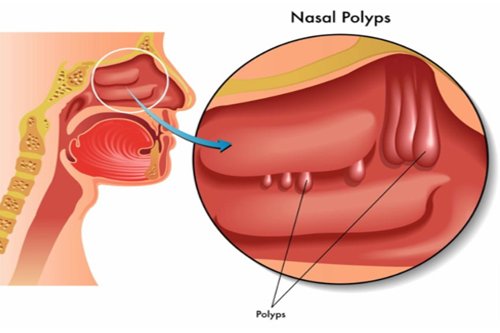Brain and ENT Clinic – Dr Lalit Mahajan In Nagpur & Dr Rachna Gangwani Mahajan In Nagpur
Nasal Polyps in Nagpur

Nasal Polyps in Nagpur are noncancerous, soft, painless growths that can form in the lining of the nasal sinuses. They are often teardrop or grape-shape and result from chronic inflammation. While they are typically benign, they can cause symptoms and complications when they grow large or in clusters.
Nasal polyps are found in the nasal passages and sinuses. They usually occur in areas where the sinuses open into the nasal cavity.Small nasal polyps may not cause noticeable symptoms, but larger or multiple polyps can lead to a variety of issues. Common symptoms include nasal congestion, difficulty breathing through the nose.Thus, a reduce sense of smell, facial pain or pressure, snoring, and a runny nose.
What symptoms do Nasal Polyps cause?
Nasal Congestion: Polyps can obstruct the nasal passages, leading to difficulty breathing through the nose and a sensation of congestion.
Runny Nose: Increase production of nasal mucus may result in a runny nose.
Decreased or Loss of Sense of Smell: Nasal polyps can interfere with the sense of smell (olfactory function), leading to a reduced ability to detect odors.
Postnasal Drip: Mucus from the nasal passages may drip down the back of the throat, causing irritation and a cough.
Facial Pressure or Pain: Large or numerous polyps can cause a feeling of pressure or pain in the face, particularly around the forehead and eyes.
Headache: Persistent congestion and sinus pressure can contribute to headaches.
Snoring: Nasal obstruction due to polyps may result in snoring during sleep.
Itchy Eyes and Sneezing: Individuals with nasal polyps may also experience symptoms similar to those of allergic rhinitis, such as itchy eyes and sneezing.
Treatment for Nasal Polyps
Nasal Corticosteroids: These are often the first-line treatment for nasal polyps. Nasal corticosteroid sprays, such as fluticasone or mometasone, help reduce inflammation and can shrink or prevent the growth of polyps. They are often use long-term.
Oral Corticosteroids: In cases of severe inflammation or when nasal polyps are large, a short course of oral corticosteroids (such as prednisone) may be prescribe. However, long-term use of oral steroids is generally avoided due to potential side effects.
Antibiotics: If there is a bacterial infection associated with the nasal polyps, a healthcare professional may prescribe antibiotics. However, antibiotics are not effective in treating the polyps themselves, only the infection.
Antihistamines: These may be recommend if allergies are contributing to the development or worsening of nasal polyps. Antihistamines help control allergy symptoms.
Leukotriene Modifiers: Medications that modify the action of leukotrienes, which are involve in inflammation, may be prescribe in some cases.
Nasal Irrigation: Saline nasal irrigation can help flush out mucus and reduce inflammation. It is often recommended as an adjunctive therapy.
Surgery: When medications are not sufficient or when nasal polyps are large and causing significant symptoms, surgical removal may be consider. Endoscopic sinus surgery is a common procedure that involves using a thin, flexible tube with a light and camera (endoscope) to remove the polyps and open up the nasal passages.
Prevention of nasal polyps
Control Allergies:
- Identify and manage allergens that may trigger nasal inflammation. This could involve reducing exposure to dust mites, pet dander, pollen, and other common allergens.
- Consult with an allergist to determine specific allergens affecting you and develop a plan to minimize exposure.
Manage Chronic Conditions:
- Treat and manage chronic conditions that contribute to nasal inflammation, such as asthma and chronic sinusitis.
- Follow your healthcare provider’s recommendations for managing these conditions effectively.
Nasal Irrigation:
- Regularly use saline nasal sprays or perform nasal irrigation to help keep the nasal passages moist and reduce inflammation.
- This can be especially beneficial for individuals prone to sinus issues.
Avoid Irritants:
- Stay away from environmental irritants such as tobacco smoke and air pollution, as these can contribute to nasal inflammation.
Maintain Good Hygiene:
- Practice good hygiene to prevent upper respiratory infections, as infections can lead to inflammation and the development of nasal polyps.
Use Corticosteroid Nasal Sprays:
- In consultation with your healthcare provider, consider using corticosteroid nasal sprays. These medications can help reduce inflammation and prevent the growth of nasal polyps.
